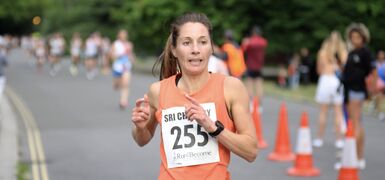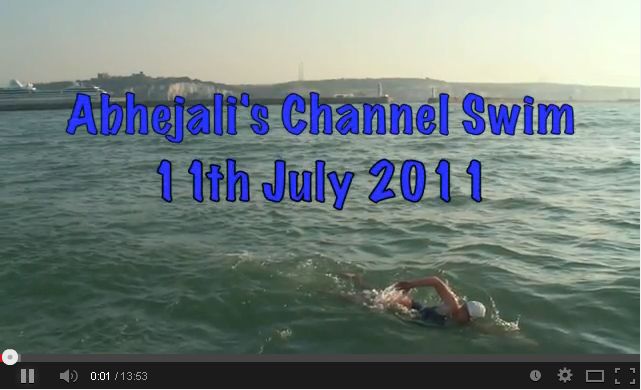Abhejali Bernardova, of the Sri Chinmoy Marathon Team from the Czech Republic has swum seven of the world's toughest stretches of open water, including the English Channel. She has also recently published a book about her swimming exploits in Czech entitled: "Until the Water Runs Out?" For a recent podcast after the book publication, Abhejali shared her thoughts on training, inspiration and meditation.

Could you tell us about yourself?
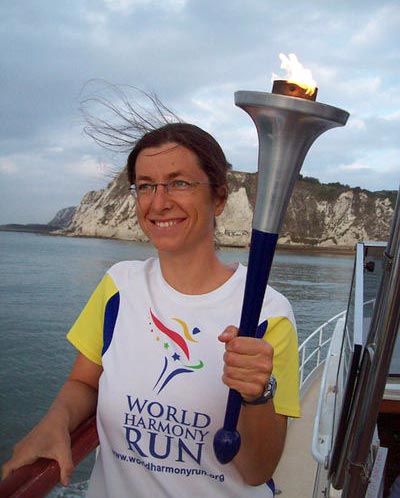 I am forty-four years old and I am from the Czech Republic, which is a landlocked country. But I love swimming in the ocean. I was the fourth woman to finish the challenge called “Oceans Seven.” And just recently I did an ultra-triathlon that included swimming the English Channel and then biking and running all the way to the Czech Republic. I just love challenges, and I’m so happy to be able to share my adventures with your listeners.
I am forty-four years old and I am from the Czech Republic, which is a landlocked country. But I love swimming in the ocean. I was the fourth woman to finish the challenge called “Oceans Seven.” And just recently I did an ultra-triathlon that included swimming the English Channel and then biking and running all the way to the Czech Republic. I just love challenges, and I’m so happy to be able to share my adventures with your listeners.
Why is the book titled Until the Water Runs Out?
It is a theme of the book, based on advice from Channel General Freda Streeter, mum of former “Queen of the Channel” Alison Streeter (Sri Chinmoy lifted both of them). Her advice to swimmers is to swim until there is no more water, until you get to the other side. There is no use in stopping and looking around, no point in asking how far to go still—you just have to swim until the water runs out. And we also should live to the fullest until the water of our life runs out.
I would like to know more about what self-transcendence means to you?
It means trying to do more than I did before and have goals that can be maybe a little bit scary and then finding ways to achieve them. One side is the sports side, but also for me, it means being a better person than I was before. I think these sports achievements help me in achieving that because so much that I learn during the swims or the runs is transferable to my day-to-day life. Not only everything goes according to plan and stuff like that. You have to find a way to go around and just keep going until you get there. I remember even for my first English Channel swim: It never happened to me during the training, but after I started swimming—maybe forty-five minutes into the swim—I got seasick. Everything else was going fine, but I just couldn’t eat or drink anything, and I was feeding the fish every twenty minutes or so. But I remember you just have to go and keep going. As long as you give it your all, then you are happy and you are making progress.
Tell me a little more about the meditation? How and why did you get into meditating? You mentioned a name, could you repeat that name?
I started meditating with Sri Chinmoy when I was eighteen. There wasn’t any outside reason for me to start meditating. I had a happy childhood. I was happy, and everything was going well, but somehow maybe—not really consciously—I felt there was something missing in my life. So I saw this poster for a meditation class and I went to see what was going on. I really liked this feeling that I felt in my heart during the meditation exercise that we did that evening. Somehow it made sense for me to continue doing these exercises and trying to find something deeper within me. I guess it’s also why I started doing long-distance swimming and running. Just to know myself better, to get more outside of my comfort zone and kind of dig deeper to see what is there. I think we are just really limiting ourselves with what our mind tells us we can do or we can’t do. With the meditation, I’m calming my mind and opening my heart and then I can see that there is so much to explore and so much more to do. So, it somehow made sense to put all of this together.
What happened after the age of eighteen? Did you go on to University, did you start working and then how did you balance the sport and swimming and your running and your cycling during that time?
I started to go to University and I started to run really slowly. I remember my very first run and I just left my house and I ran around the block, it was like five minutes and I felt okay, I started running. Then I increased the distance. It was like twenty-five years ago so there were no, not that many races like there are now and the Sri Chinmoy Marathon Team we started organising races, six hours, twelve hours, 100k. So when we did organise these races I wanted to try them out and see how far I could go. So from those five minutes I went to 3k, 10k then a marathon and then that six-hour. Then I still felt I could do more. So, it was just nice to widen my limits or my so-called limits. In a way, it was growing really slowly and then we organised a twenty-hour hour race and then actually I was helping my friend in New York and she ran a race that was one thousand miles long. It was in a park on a one-mile loop and I remember running a marathon after she finished the race maybe a week later. And I ran a marathon on the same loop and I remember that it was my easiest marathon ever because it was twenty-six laps whereas she had to do one thousand laps. So I could totally see how if you change your perspective, if something feels difficult then just look at it from a different side or different height. So that was my easiest marathon.
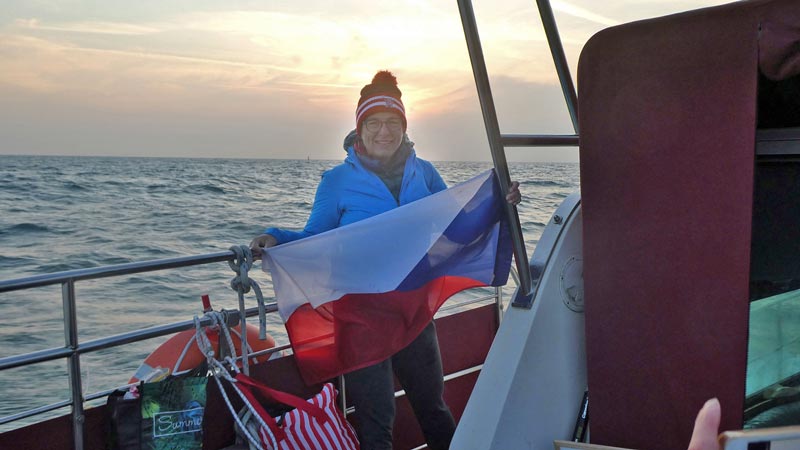
For those people who maybe haven’t given swimming a go or they want to start pushing themselves and going for longer distances, what would be your advice about going further with swimming? Increasing your time from one hour to two hours to three hours or six or twelve to fifteen hours?
I think one important thing to have a really good technique, like a stroke. Because then if you have a good stroke, good form, then you can go forever. Then for me, like mentally it’s good to not think about you are going to train for ten hours because then your mind starts revolting and telling you you are crazy, why are you doing this? Different things that the mind does to us to discourage us. I would just think of going for a few hours and then while I swim I would just go from one feeding to the next. I would eat every half an hour so then you have just half an hour to go and then another half an hour. For my long swims I would do training, maybe six hours on Saturday, six hours on Sunday and what would help would be when you go for the second six hours on Sunday you are sore and you are tired then you don’t really feel so happy to go in the water, especially if the water is cold, but then I would imagine this is my hour number seven, number eight, until twelve. So I would take it as a whole chunk of twelve hours and then it’s like you have done half of it and then I would go downhill, I always like the second half of the race, of the distance, because then it feels like you are already on your way home. Somehow like mentally divide it, make it shorter, do different things to quiet your mind which in general is discouraging and trying to tell you that you don’t want to do this, you are too tired, you are too cold and different things to really stop you from doing it.
Is that when doing back to back training, six hours on Saturday, six hours on a Sunday, you could wake up feeling so sore and tired, what are you tips for recovery? How do you make sure that you stay injury free when you are doing endurance training of this length?
I try to eat really well. I’m a vegetarian but just to really have proper food even during the training I don’t really like having gels that much, we have soup or porridge or different things so that my body is really, really nourished. And then I try to sleep as much as I can in between the trainings and just stay positive, stay happy even though I am tired, especially when you are starting your training, your body needs to get used to it. Just being in a positive frame of mind. I think that is a big help to prevent injury. When you are happy to be out there in the water and swim and just be grateful that you can do it, you are the one who is in the water, this gratitude helps so much too.
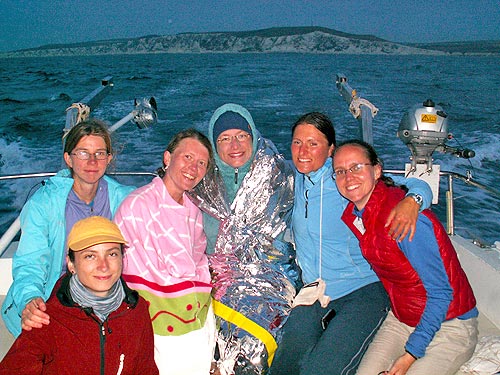
Tell me about Oceans Seven? What is the Oceans Seven challenge?
The Oceans Seven challenge involves seven swims around the globe that are difficult in some way or another. One of them is the English Channel. Then the North Channel between Ireland and Scotland, which is even colder than the English Channel. I never really wanted to swim this one. Then there are some warm-water swims like Hawaii’s Moloka’i Channel, which is really long. It is more than 42k, which is a marathon distance. Then there is Cook Strait in New Zealand, Tsugaru Strait in Japan, Strait of Gibraltar which is from Europe to Africa which I really loved. And there is Catalina Channel, which is from Catalina Island to Los Angeles. So, those are the seven swims and there are tides, there are waves, there are swells, and there are some marine animals that are kind and not so kind. So there are different challenges in the swims.
Do you have a mantra or a motto that you sort of apply to your challenges and events?
I have one that I really like and it’s “I can do it, I have already done it.” It’s actually what Sri Chinmoy advised people when they were swimming the English Channel to really use the imagination even while training, to tell yourself “I can do it.” Imagine that you are swimming to the French shore and I am there. And just visualise it and then make it a reality, that’s my favourite. And I use mantras and singing when things get tough. There is a song that Sri Chinmoy composed, “I am swimming in the English Channel today” so I was singing that song quite a lot during the swim.
I’d love for you to share your final words of advice to encourage other women and girls to step outside their comfort zone and to take on a new challenge. Apart from saying “just do it” what advice would you have for our listeners?
Dream big and don’t be afraid to dream. Don’t feel that you are too old to dream and to do different challenges and then just find ways to reach those goals and those challenges and sometimes it takes some years to really be able to do it but just not giving up. And then you get there and don’t allow your mind to tell you that you are too old, you are too weak, you can’t do it. You can do it and if you try then at least you can say that you tried. If you don’t try then you definitely won’t be able to accomplish that. So dream big.
Would you mind sharing a little more about what you main goal is in life?
My main goal I would describe as really knowing myself, what I am, why I am here, what I am supposed to do and just being me. Being the best version of me and getting better every day, becoming a better person.
Here some video-footage of Abhejali's Channel Swim from 2011


